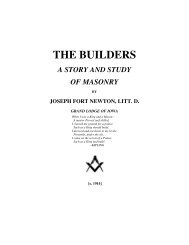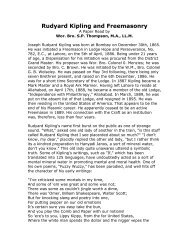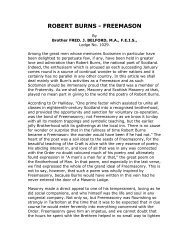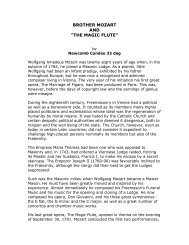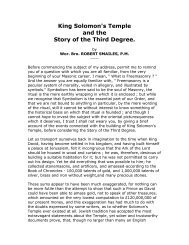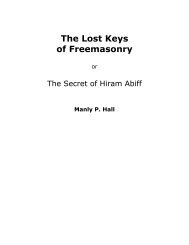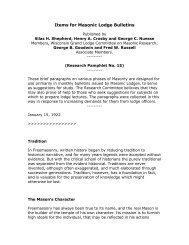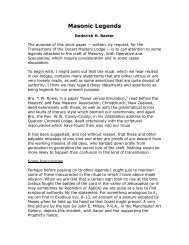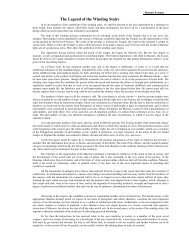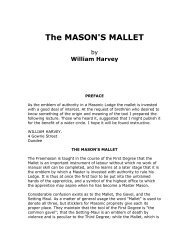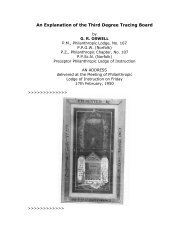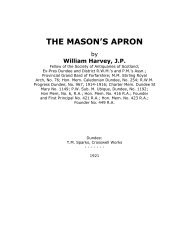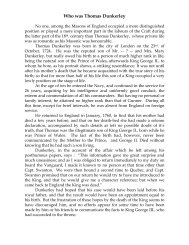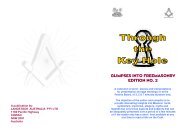The Albury MS. THE AMALGAMATED GUILD OF ... - RoseCroix.org.au
The Albury MS. THE AMALGAMATED GUILD OF ... - RoseCroix.org.au
The Albury MS. THE AMALGAMATED GUILD OF ... - RoseCroix.org.au
Create successful ePaper yourself
Turn your PDF publications into a flip-book with our unique Google optimized e-Paper software.
Eastern nations are very conservative in manners; there is scarcely<br />
any difference since the time of Christ, and perhaps but little since the<br />
days of Solomon.] of the Indian population, the country whence the<br />
Jewish tribes derived their origin; it is therefore presumable that<br />
Solomon did little more than improve the <strong>org</strong>anization he found in<br />
existence, by a quasi-military system, and on a large scale. <strong>The</strong> bodies<br />
of men, we call lodges, were presided over by master- workers; the<br />
lodges themselves consisted of journeymen, and perhaps, and<br />
probably, also of apprentices. <strong>The</strong>se master-workers were subject to<br />
overseers, and these again to the chief overseer or clerk of the works,<br />
subject him self to the architect, or him who conceived the general<br />
plan of the building to be erected, but the name neither of the<br />
architect nor of the builder is given, nor are they referred to.<br />
<strong>The</strong>se guilds, or the evident traces of them, still exist in all the older<br />
countries of Europe and Asia. In Germany, perhaps, the old<br />
<strong>org</strong>anization is still more perfect elsewhere in the west, as it has not<br />
been the practice in later times to admit into them non-tradesmen.<br />
<strong>The</strong>ir <strong>org</strong>anization in the middle age was generally as follows, for all<br />
trades alike:-No tradesman could set up as a master in his craft and<br />
take apprentices who was not freeman of the city in which he wrought;<br />
not being such freeman, he was called a freemaster, and could carry<br />
on his trade as such, without the power to take apprentices, who,<br />
having wrought for a certain time, were required to travel for five<br />
years as journeymen to perfect themselves in their craft [Kraft means<br />
power; handicraft, manual power or ability. Science-craft was<br />
equivalent to "cunning" in old English (cyning, Saxon). A "cunning<br />
wheelwright" does not mean cunning or crafty, in the present sense,<br />
but only "capable" - skilled in his handiwork] in other cities. <strong>The</strong><br />
journeyman, on his arrival in any city, applied to the corresponding<br />
affiliated guild of his craft in such place, where he obtained information<br />
of some master and who required his services. Having wrought under<br />
him for a given time, the employer, being satisfied with him,<br />
communicated to him the " Kennzeichen," or word of recognition of the<br />
place, as a proof of his having wrought there. This Kennzeichen was<br />
usually some unimportant object which would not attract general<br />
observation; thus a conceit of the sculptor had induced him to carve a<br />
bird's nest behind the statue of Rolland, the Palladium of Bremen, and<br />
a small mouse on the sculpture which surrounds the apse of the<br />
Cathedral of Lubeck, and on the return the knowledge of these<br />
Kennzeichen by the journeyman was considered as evidence of his<br />
having wrought faithfully in the place to which they referred; in this<br />
consisted his examination for the condition of a freemaster or<br />
craftsman to which he was admitted on proper application, in the



